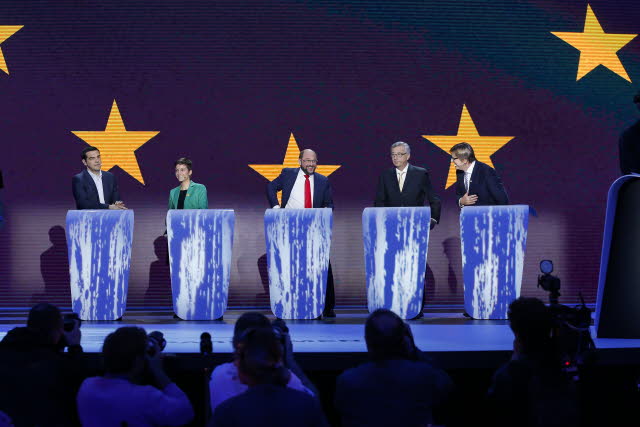The candidates for the European Commission presidency debating on 15 May, 2014. From left, Alexis Tsipras from Greece, Germany's Ska Keller and Martin Schulz, Luxembourg's Jean-Claude Juncker, and Belgium's Guy Verhofstadt.
Today the first polls for the European Parliament election opened. People in the Netherlands and Britain will be among the first Europeans to cast their ballots in the marathon election spanning 28 countries in four days. And this election might be the most important one in recent history.
Extreme far-right parties are making gains throughout Europe, spreading dangerous xenophobia and hate. And a low voter turnout could be in their favor. It’s therefore important to participate and vote for democracy, for equality and human rights. Let’s show these hateful and ignorant people that we Europeans have learned from our dark past. That we won’t forget. And that we won’t accept their sick and misguided worldview.
It’s an important election, for many reasons. But the most pressing issue of our time is obviously climate change. It is the crisis that could destroy everything that we and generations before us have worked so hard to achieve. We have known about climate change for decades now. But we have done nothing. And we can’t blame it on ignorance – that we didn’t know any better. In a sense, the climate crisis could really be the biggest political failure in human history.
The European Union is the world’s largest economy. The largest share of capital and the largest state budgets are all located within Europe. Together, Europe is an economic powerhouse capable of anything. But climate action cost. It’s estimated that we need to spend a few thousand billions annually to save the climate. That might sound like too much – especially in the wake of an economic crisis. But it’s not much compared to the EU’s total GDP, which is over €13 trillion. Combating climate change clearly wouldn’t hurt us economically. It wouldn’t even cost us one percent of EU’s total GDP.
Climate change is supranational, it’s a global problem that doesn’t care about nations or borders. Therefore the solutions need to be supranational. And despite all it flaws – believe me, there are many – the European Union is this solution.
Together, the European Union could create a common energy market that favors renewable energy over dirty fossil fuels. The EU could easily promote cleaner and greener modes of transportation. We could create a unified transportation system which makes it possible for people to travel across Europe, quickly and comfortable. There are of course many other examples.
But none of this is possible to accomplish for nations on their own – it would simply take too long. And it doesn't help that the current energy market is based on national monopolies and cartels. These are corporations that profits from tariffs, restrictions and lousy energy transfers between countries. Changing this outdated business model is a daunting task for the EU alone, but it will be even harder to accomplish if countries try to negotiate possible solutions with neighboring countries on their own. It would be like the current railroad system, where Swedish trains cannot travel in Europe because the railway tracks and systems differs between countries.
A unified Europe is something we should strive for – it’s in our best interests. But which party should get your vote?
The conservatives doesn’t seem to grasp the severity of climate change. The liberals put their faith in the market, hoping the market will solve the climate crisis on its own terms - the very same solution they advocate for every problem. The Social Democrats seems too keen to safeguard national economic and industry interests. And the socialists, well they unfortunately don’t see the possibilities of a unified Europe. For a democrat, the remaining choice are the European Greens. They are the only political group that has constantly pushed the hardest for human rights, solidarity, and real and meaningful action against climate change in the EU.
But PollWatch published its final election prediction a few days ago. And according to their numbers, the conservative party group, the EPP, would again receive the majority of the seats in the parliament. The Social Democrats would be the second largest political group. EPP would get 217 seats, 16 more than the Social Democrats. The Greens would actually lose seats, going from their current 58 seats to 44 seats. This would mean that the main EPP candidate, Jean-Claude Juncker could soon become EU's most powerful politician.
This would be a sad outcome. Juncker is basically the epitome of conservatism. He is old, white and male. In debates, Juncker has used the term "floodgates" to talk about migrants. He has claimed he "don't know anything" about the TTIP mandate. And his political group - which includes abortion opponents, homophobes and nationalists - supports "fracking" and austerity measures, among many things. Juncker and the EPP would surely mean bad news for our environment, and an EU that will continue to lack the political will to modernize and combat climate change head on.
It’s clear that the green voice must be strong if the European Parliament should make any meaningful progress on climate. I therefore ask you to take part in the elections, and that you vote for a greener and fairer Europe.


Recommended Comments
Join the conversation
You can post now and register later. If you have an account, sign in now to post with your account.